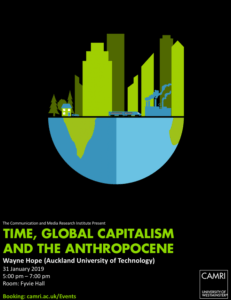Time, Global Capitalism and the Anthropocene
309 Regent St
Marylebone, London W1B 2HT
UK

Wayne Hope (Auckland University of Technology, New Zealand) – Time, Global Capitalism and the Anthropocene
Evidence from multiple disciplines suggests that the earth as a system has experienced a historical step-change in the relationship between the human species and the natural world. Human action and earth dynamics have converged; they can no longer be seen as disparate entities. Human inhabitants have perpetrated and are facing unprecedented environmental shifts. It is now evident, in retrospect, that the switch from organic surface energy to underground fossil energy has intertwined the time of the earth with the time of human history. The convergence of these different kinds of historical time was prefigured by the externalisation and instrumentalisation of nature as a resource for humanity. Understanding the capitalist relations of power involved here requires that we rethink industrial capitalism in the historical context of a world system built upon an unequal socio-ecological exchange between core and periphery.
From the preceding insights, Wayne Hope will in this seminar advance the following arguments. First, global capitalism has intensified the anthropogenic feedback loops associated with CO2 emissions and climate change and universalised organisational frameworks of profit extraction and socio-ecological destruction. Second, the growing costs of monetising what Jason Moore calls ‘the Four Cheaps’ (energy, raw materials, food, labour) means that global capitalism cannot continue without destroying the socio-ecological wellsprings of its existence. Third, global-technological mediations of commodity fetishism and associated ideological forms obscure the plutonomy of global capitalism, the materialities of unequal socio-ecological exchange, and the ‘slow violence’ of socio-ecological destruction. Finally, a critique of these developments can be theoretically constructed by giving ecological resonance to four epistemes of time: epochality, time reckoning, temporality and coevalness. From this epistemological framework, one can identify preconditions for the advancement of eco-socialist activism on a global scale.
Biography
Wayne Hope is a Professor in the School of Communication Studies at the Auckland University of Technology, New Zealand. His specific areas of research include: New Zealand media history and public sphere analysis, the political economy of communication, sport-media relationships and globalisation and time. He is the author of Time, Communication and Global Capitalism (Palgrave, 2016 – described by a reviewer as “a virtuoso work of synthesis, provocative and pathbreaking. It needs to be read by anyone interested in the ways we live now, where we might be headed and how we might arrive at destinations not at the neoliberal route map”). His research has also been published in a range of journals including Media, Culture & Society, the International Journal of Communication and Time & Society. He is founding co-editor of the online journal Political Economy of Communication. Within New Zealand, Wayne has appeared regularly as a media commentator on television and radio when not writing pieces against neoliberalism in The Daily Blog.

